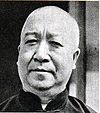Fengtian clique (from Chinese ex. 奉天 , pinyin : Fèngtiān , pall .: Fengtian - the old name of Shenyang city), a northeastern group of Chinese militarists.
| Historical state | |||
| Fengtian clique | |||
|---|---|---|---|
| |||
← 1912 - 1932 | |||
| Capital | Mukden | ||
| Largest cities | Xinjing , Mukden , Manzhouli , Harbin , Chengde | ||
| Languages) | Manchurian , Chinese | ||
| Square | 1,554,000 km² ( 1928 ) | ||
| Commander-in-Chief | |||
| • 1912 - 1928 | Zhang Zolin | ||
| • 1928 - 1932 | Zhang Xueliang | ||
| Story | |||
| • 10/10/1911 - 12/02/1912 | Xinhai revolution | ||
| • 08/14/1920 - 08/23/1920 | Zhili Anhui War | ||
| • April 1922 | First Zhili-Feng Feng War | ||
| • September 15, 1924 - November 3, 1924 | The Second Zhili-Feng War | ||
| • 10.23.1924 | Beijing coup | ||
| • November 1925 - April 1926 | Anti-Fengtian War | ||
| • 1926 - 1927 | Northern hike | ||
| • 06/04/1928 | Attempt on Zhang Zolin | ||
| • 12/29/1928 | Change flags | ||
| • 09/18/1931 - 02/18/1932 | Japanese intervention in Manchuria | ||





The Fengtian clique was the predominant force in the central government in Beijing from 1924-1928. The leaders of the clique repeatedly led the Beijing government. In the government, the clique fought for influence with the Chilean clique and the Anhui clique , and this confrontation was accompanied by complex intrigues and military clashes.
Content
History
It was led by Zhang Zolin . It had three Manchu Northeastern provinces ( Liaoning , Jilin and Heilongjiang ) with its territorial base. It was closely associated with the Japanese. She played a significant role in the political life of China in 1920-28.
The fight against the Anhui clique
In 1920, Zhang Zolin supported the Zhilian clique army in the Zhili-Anhui War , which ended in the complete defeat of the Anhui clique . After the victory, representatives of the Fengtian clique entered the Beiyang government (together with the Zhilian clique ).
Confrontation with the Chilean clique
The first Zhili-Fengtian war in 1922 ended in defeat, and Zhang Zolin was deprived of government posts and influence.
After the defeat, the Fengtian clique began to seriously prepare for war. The second Zhili-Fengtian war entered the active phase on September 15, 1924, and was fought on two fronts. The war dragged on, but on October 22, Feng Yuxiang unexpectedly made the Beijing coup , betraying the Zhilian clique, which predetermined its defeat by November 7.
Control of the Government 1924-1925
After the second Zhili-Fengtian war in November 1924, a coalition government was formed in Beijing from Zhang Zolin (from the Fengtian clique), Feng Yuxiang (from the People’s armies ) and Duan Qijuya (from the Anhui clique). The head of government was Duan Qijuy, but there was no real power behind him and he was rather a nominal figure. Feng Yuxiang and Zhang Zolin were in constant confrontation and were looking for ways to force each other out.
Zhang Zolin was able to conclude a separate agreement with Wu Peifu and the Chilean generals. Feng Yuxiang relied on the People’s Armies and took a position close to the Kuomintang and Sun Yat-sen .
Anti-Fentian War
The People’s Army managed to capture Beijing and push the Fentians to the northeast.
In October 1925, Feng Yuxiang managed to lure General Guo Songlin from the Feng Tian clique, which besieged Mukden on November 22. The combined forces of the Fengtans and Zhilians rose up against the People’s Armies , Guo Songlin was killed on December 24, the siege of Mukden was lifted, and in January Feng Yuxiang resigned.
The People's Army held Beijing until April 1926. On April 20, 1926, Zhang Xueliang’s troops occupied Beijing, followed by Wu Peifu’s troops, the city was looted.
Government control 1926-1928
In 1926-1928, the Fengtian clique again controlled the Beiyang government .
It was very difficult to create a joint government with the Zhilians, and the confrontation continued. After several short-lived coalition offices, Zhang Zolin was proclaimed president, and remained in office until his death in 1928 as a result of a terrorist attack (the explosion of the Beijing-Shenyang train) (see Huang-tung incident ). The materials published in 2001 showed that the operation to eliminate Zhang Zolin was carried out by Soviet intelligence, the direct organizer was N. I. Eitingon (later - Major General of the Ministry of State Security) together with the resident intelligence officer of the Red Army in Shanghai, H. Salnin [1] . After the death of Zhang Zolin, his son Zhang Xueliang inherited the command of his troops and power over Manchuria.
In June 1928, the Fengtian clique recognized the authority of the Kuomintang government . The Fengtian clique had relatively new weapons (for example, the Renault FT-17 tank was in service with Zhang Zolin in the army).
See also
- Progomindanovsky Jihad in Gansu
Notes
- ↑ A. Kolpakidi, D. Prokhorov. Foreign intelligence of Russia. - St. Petersburg: Neva, Olma-Press, 2001 .-- S. 398. - 512 p. - ISBN 5-7654-1408-7 , ISBN 5-224-02406-4 .
Literature
- in Russian
- Selivanov I.N. § 5 China in 1914-1925 // Recent history of the countries of Asia and Africa, XX century: Textbook for students of higher educational institutions: In 2 hours. Part 1: 1900-1945 / Ed. A.M. Rodriguez . - M .: Humanitarian Publishing Center Vlados, 2001. - S. 88-101. - 368 p. - ISBN 5-691-00644-4 , ISBN 5-691-00645-2 .
- in other languages
- McCord EA The Power of the Gun, The Emergence of Modern Chinese Warlordism . - Berkeley: University of California Press , 1993. - 436 p. - ISBN 978-0-520-08128-4 .
- Waldron A. . From War to Nationalism: China's Turning Point, 1924-1925 . - Cambridge: Cambridge University Press , 1995 .-- 416 p.
